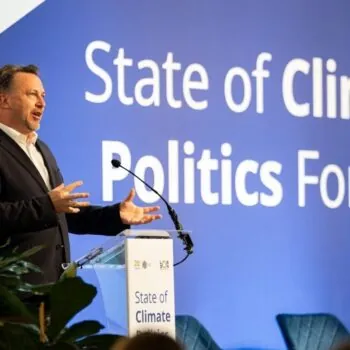As part of the Japanese Presidency of the G8, the 14-16 March saw a gathering of the G20 group of nations in Chiba for the 4th Ministerial meeting of the Gleneagles Dialogue on Climate Change, Clean Energy and Sustainable Development.
E3G’s Jennifer Morgan was in attendance, and featured prominently in media reporting of the ministerial discussions.
Firstly, in advance of the meeting concerns were already being raised about the nature of new climate funds proposed by the UK, Japan and USA, as reported by Reuters:
“What seems to be happening is that you have three announcements from Japan, Britain and the U.S. that have now been combined into a World Bank special strategic climate fund,” said Jennifer Morgan of environmental institute E3G.
But she said the multi-billion dollar scheme did not appear to have much new money, had left developing countries out of negotiations on how the money would be used until very recently, and had quite a number of conditions attached.
“It’s been used by the Bush administration to promote their own major emitters’ meeting process,” Morgan said, referring to separate U.S. talks with big polluters outside U.N. discussions seeking a global pact to replace the Kyoto Protocol.
“It is not creating a very good mood going into the G20,” said Morgan.
This theme was then taken up by the International Herald Tribune:
To be effective, funds such as the U.S. one need more money, should be formed with full consultation with the countries receiving the funds and should continually generate additional money, said Jennifer Morgan, with the E3G environmentalist group. “Unfortunately, none of these criteria have been met,” she told reporters.
As the meeting progressed, attention turned to whether Japan would display leadership on climate change during its G8 presidency, particularly after it had been criticised by developing countries for its promotion of a sectoral approach to energy efficiency. AFP this time reporting that:
Jennifer Morgan, the climate change programme director for Britain’s E3G group, said the EU and developing countries had a “similar will” in fighting climate change, while US President George W. Bush’s administration was sidelined. “So, really, the question is how Japan will rebuild its credibility moving up towards the G8,” she said.
The theme of Japanese leadership was continued in the post-meeting analysis, with the English-language Japan Times carrying an article looking at whether the Japanese government was a true leader or merely a ‘reader’ of other’s scripts. Jennifer was quoted in respect to the process set in motion in December in Bali:
Jennifer Morgan, climate and energy director of E3G, a British-based company working for sustainable development, said that the outcome of the Bali meeting was minimum in the sense that it did not decide what level of targets the nations would have.
“But it was also a maximum one. It was [the] most likely and most possible with the current Bush administration at the table,” Morgan said—pointing to the next U.N. conference on climate change to be held in Copenhagen in 2009. “But Copenhagen has to be the maximum outcome for all. And it has to push the limits of all countries to come to a common agreement that is based on fairness and ambition.”
Morgan also said she hopes Japan moves forward with a national cap-and- trade system. Under such a system, introduced in the European Union in 2005, companies are obliged to set emissions-cut targets and are able to trade emission credits to achieve their goals… “We all hope that Japan will emerge into a leader, not a reader, on climate-change politics,” Morgan of E3G said.



